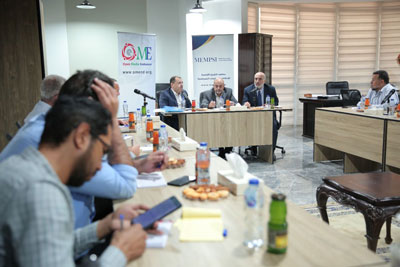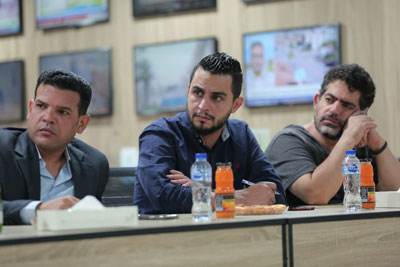


With nuclear agreement imminent -MEMPSI symposium panelists warn of the Iranian danger in the region
Deal will give strategic depth to Khamenei’s proxy armies in Iraq, Syria, and Yemen
Critical Consensus: Arab states have the most to lose from a restored JCPOA
Participants in the Middle East Media and Policy Studies Institute’s “Nuclear Agreement with Iran and Its Implications for the Region” symposium warned that restoring the JCPOA would amplify the dangers of existing Iranian policies in the region.
Notable politicians and policy experts joined MEMPSI’s forum moderated by Prof. Faisal Al-Rufou, dean of Prince Hussein’s College of International Studies at the University of Jordan. Panelists discussed the effects and repercussions of Iranian policy on the region.
AN AMBASSADOR’S PERSPECTIVE
Dr. Bassam Al-Amoush, Jordan’s former ambassador to Iran, said Tehran’s expansionist policy in Arab countries undermines their security. As an example, Al-Amoush explained how Iranian “religious tourism” became a tool to harm Jordanian interests.
“In Syria, they settled and established institutions and neighborhoods, pricing tickets from Tehran to Damascus as low as fifty dollars. Anyone remaining in Syria collected a monthly salary. “
“Iranians who went to Bahrain, Sudan, Algeria, Tunisia, Morocco, and Saudi Arabia received similar benefits,” added the ambassador.
Al-Amoush pointed out that calls for Iranian religious tourism in Jordan are longstanding. Still, the kingdom’s security awareness has always stood as an obstacle to Tehran’s dreams of finding a foothold in the country.
“As an ambassador in Tehran , the Iranians offered to [serve as the contractors to] withdraw the Disi water, and I said: do it through your companies and we will compete with each other. They told me they wanted to hire Iranian workers because of unemployment in Iran, so I understood that they wanted to settle under the pretext of work,” Al-Amoush.
Eventually, the project to pump water from the Jordan-Saudi border zone to Amman was completed by the Disi Water Company (Diwaco), a Turkish construction company GAMA Energy subsidiary, as a build-operate-transfer concession.
“The Iranians do not want tourism, they want to undermine security and stability in Jordan, and decision-makers must be vigilant,” Al-Amoush concluded.
ANALYST’S WARNINGS
Tehran recently responded to American proposals asking for additional “sweeteners,” said Dr. Nabil Ali Al-Atoum, professor of political science and expert in Iranian affairs.
Al-Atoum told the MEMPSI symposium that Washington had already satisfied many of Iran’s conditions to resume the nuclear agreement in 2015.
Al-Otoum added that Tehran insists on lifting all economic sanctions as a prerequisite for the nuclear agreement.
Media leaks indicate that conditions for returning to the nuclear agreement will initially include lifting sanctions on the Central Bank of Iran and seventeen of the county’s most important banks.
They are calling for lifting sanctions on the Khatam al-Anbiya Foundation, the economic arm of the Iranian Revolutionary Guards, and the Quds Force as well as the immediate release of seven billion dollars held in South Korean banks.
Demands easing sanctions on no less than 150 Iranian institutions, including SETAD, otherwise known as the “Committee for Executing the Imam’s Order” – a state-linked conglomerate Al-Otoum reminded symposium participants.
Other provisions include:
Allowing the sale of 120 million barrels of oil within 120 days.
Cancelation of executive orders approved by former President Donald Trump in May 2018 when he pulled the US out of the JCPOA.
Reversing the June 2019 Executive Order Number 13876 leveled against Supreme Leader Khamenei and his advisors.
The demands also included provisions that foreign companies obtain sanctions exemptions should the United States withdraw from the agreement. Tehran also continues the exploitation of dual national detainees to blackmail America and the European Union by insisting on a prisoner exchange.
Al-Otoum said that Tehran monitors the US National Security Council’s statements closely, highlighting that Washington’s communications with the Europeans are hardly “secret.”
Despite Iranian statements to the contrary, Khamenei’s regime attempts to package new Western concessions to prepare internal public opinion. The government emphasizes US guarantees that no future administration will withdraw from the nuclear agreement once ratified.
Al-Otoum also addressed Israel’s fears of a revived agreement. Israeli Prime Minister Yair Lapid told the Biden White House that European Union’s drafts “do not conform to the red lines” delineated at the start of its term in office.
Lapid also reiterated his country’s opposition to a return to the JCPOA during a meeting with German chancellor Olaf Scholz. The Israeli leader asked Scholz to “transmit a sharp and clear message from Europe that the West will make no more concessions to the Iranians.”
TEHRAN’S REAL TARGET: THE ARAB STATE SYSTEM
Yet Al-Otoum still expects a signing of the agreement stressing the imminent danger to the countries of the Arab region, which will be the biggest losers of this agreement.
Tehran’s success in neutralizing provisions against research for missile, space, and drone programs is now coupled with destabilizing repercussions for Jordan of Iran’s role in building the Malik Al-Ashtar base in southern Syria.
In addition, it tries to threaten Jordan’s security through the ongoing smuggling of drugs, weapons, and ammunition to target Gulf security through the Jordanian gate.
Al-Otoum points out the importance of supporting Jordan on the Arab and international levels to confront this danger.
The professor linked Iran’s possession of nuclear weapons to the danger of consolidating hostility toward the Arab world politically, religiously, and intellectually. Teheran exploits the regional crises to settle scores with the countries of the Arab region since Iran seeks military nuclear capabilities driven by sectarian and strategic motives.
It is also trying to expand its activity to mobilize against its actual enemy, Arabs, for whom Iran harbors hatred and incitement. Finally, it consolidates power through educational, political, and “religious” means.
Al-Otoum added that it is necessary to pay close attention to what Iranians say about Arabs and how their views spread in the mass media and education system.
He said that the hostility taught in school textbooks affects Iranians’ upbringing, behavior, values and ideas, and political action.
He stressed that the gradual building of Arab hatred is counterproductive to the future of Iranian-Arab relations.
Al-Otoum highlighted the sectarian religious indoctrination in Iran’s military academies. These institutions propagate a particular Persian interpretation of Shiite doctrine built on the militancy instilled in primary and secondary school settings.
The regime incorporates these concepts into educational curricula for school and university stages.
School books teach children content about how citizens must struggle against “unjust” groups such as the Yazidi people. Iranian education divides Islam into camps of truth and falsehood.
Al-Otoum shared his experience as a doctorate political science student at the University of Tehran. He linked the role of Iranian curricula to the entrenching hostility against more Arabs than Israel–which Iran constantly claims to confront with extraordinary effort.
Al-Otoum warned Arabs not to be deceived by Iran’s slogans claiming it promotes the Palestinian cause, which is how Teheran tries to infiltrate the conscience of the Arab peoples. Iran used these slogans to build four parallel armies, a fighting force that will advance its anti-Arab interests in the future.
